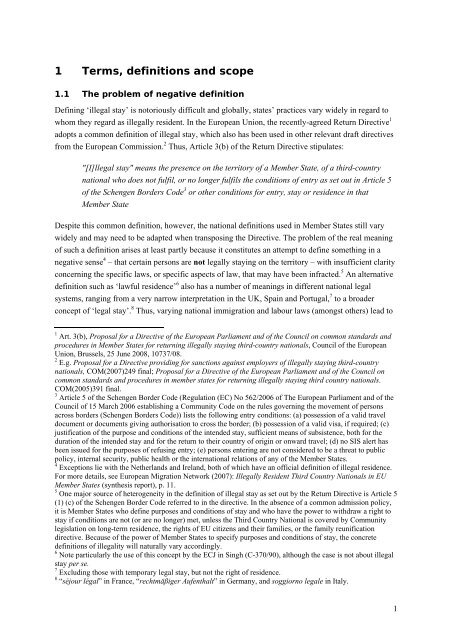REGINE Regularisations in Europe Final Report - European ...
REGINE Regularisations in Europe Final Report - European ...
REGINE Regularisations in Europe Final Report - European ...
You also want an ePaper? Increase the reach of your titles
YUMPU automatically turns print PDFs into web optimized ePapers that Google loves.
1 Terms, def<strong>in</strong>itions and scope<br />
1.1 The problem of negative def<strong>in</strong>ition<br />
Def<strong>in</strong><strong>in</strong>g ‘illegal stay’ is notoriously difficult and globally, states’ practices vary widely <strong>in</strong> regard to<br />
whom they regard as illegally resident. In the <strong>Europe</strong>an Union, the recently-agreed Return Directive 1<br />
adopts a common def<strong>in</strong>ition of illegal stay, which also has been used <strong>in</strong> other relevant draft directives<br />
from the <strong>Europe</strong>an Commission. 2 Thus, Article 3(b) of the Return Directive stipulates:<br />
"[I]llegal stay" means the presence on the territory of a Member State, of a third-country<br />
national who does not fulfil, or no longer fulfils the conditions of entry as set out <strong>in</strong> Article 5<br />
of the Schengen Borders Code 3 or other conditions for entry, stay or residence <strong>in</strong> that<br />
Member State<br />
Despite this common def<strong>in</strong>ition, however, the national def<strong>in</strong>itions used <strong>in</strong> Member States still vary<br />
widely and may need to be adapted when transpos<strong>in</strong>g the Directive. The problem of the real mean<strong>in</strong>g<br />
of such a def<strong>in</strong>ition arises at least partly because it constitutes an attempt to def<strong>in</strong>e someth<strong>in</strong>g <strong>in</strong> a<br />
negative sense 4 – that certa<strong>in</strong> persons are not legally stay<strong>in</strong>g on the territory – with <strong>in</strong>sufficient clarity<br />
concern<strong>in</strong>g the specific laws, or specific aspects of law, that may have been <strong>in</strong>fracted. 5 An alternative<br />
def<strong>in</strong>ition such as ‘lawful residence’ 6 also has a number of mean<strong>in</strong>gs <strong>in</strong> different national legal<br />
systems, rang<strong>in</strong>g from a very narrow <strong>in</strong>terpretation <strong>in</strong> the UK, Spa<strong>in</strong> and Portugal, 7 to a broader<br />
concept of ‘legal stay’. 8 Thus, vary<strong>in</strong>g national immigration and labour laws (amongst others) lead to<br />
1 Art. 3(b), Proposal for a Directive of the <strong>Europe</strong>an Parliament and of the Council on common standards and<br />
procedures <strong>in</strong> Member States for return<strong>in</strong>g illegally stay<strong>in</strong>g third-country nationals, Council of the <strong>Europe</strong>an<br />
Union, Brussels, 25 June 2008, 10737/08.<br />
2 E.g. Proposal for a Directive provid<strong>in</strong>g for sanctions aga<strong>in</strong>st employers of illegally stay<strong>in</strong>g third-country<br />
nationals, COM(2007)249 f<strong>in</strong>al; Proposal for a Directive of the <strong>Europe</strong>an Parliament and of the Council on<br />
common standards and procedures <strong>in</strong> member states for return<strong>in</strong>g illegally stay<strong>in</strong>g third country nationals.<br />
COM(2005)391 f<strong>in</strong>al.<br />
3 Article 5 of the Schengen Border Code (Regulation (EC) No 562/2006 of The <strong>Europe</strong>an Parliament and of the<br />
Council of 15 March 2006 establish<strong>in</strong>g a Community Code on the rules govern<strong>in</strong>g the movement of persons<br />
across borders (Schengen Borders Code)) lists the follow<strong>in</strong>g entry conditions: (a) possession of a valid travel<br />
document or documents giv<strong>in</strong>g authorisation to cross the border; (b) possession of a valid visa, if required; (c)<br />
justification of the purpose and conditions of the <strong>in</strong>tended stay, sufficient means of subsistence, both for the<br />
duration of the <strong>in</strong>tended stay and for the return to their country of orig<strong>in</strong> or onward travel; (d) no SIS alert has<br />
been issued for the purposes of refus<strong>in</strong>g entry; (e) persons enter<strong>in</strong>g are not considered to be a threat to public<br />
policy, <strong>in</strong>ternal security, public health or the <strong>in</strong>ternational relations of any of the Member States.<br />
4 Exceptions lie with the Netherlands and Ireland, both of which have an official def<strong>in</strong>ition of illegal residence.<br />
For more details, see <strong>Europe</strong>an Migration Network (2007): Illegally Resident Third Country Nationals <strong>in</strong> EU<br />
Member States (synthesis report), p. 11.<br />
5 One major source of heterogeneity <strong>in</strong> the def<strong>in</strong>ition of illegal stay as set out by the Return Directive is Article 5<br />
(1) (c) of the Schengen Border Code referred to <strong>in</strong> the directive. In the absence of a common admission policy,<br />
it is Member States who def<strong>in</strong>e purposes and conditions of stay and who have the power to withdraw a right to<br />
stay if conditions are not (or are no longer) met, unless the Third Country National is covered by Community<br />
legislation on long-term residence, the rights of EU citizens and their families, or the family reunification<br />
directive. Because of the power of Member States to specify purposes and conditions of stay, the concrete<br />
def<strong>in</strong>itions of illegality will naturally vary accord<strong>in</strong>gly.<br />
6 Note particularly the use of this concept by the ECJ <strong>in</strong> S<strong>in</strong>gh (C-370/90), although the case is not about illegal<br />
stay per se.<br />
7 Exclud<strong>in</strong>g those with temporary legal stay, but not the right of residence.<br />
8 “séjour légal” <strong>in</strong> France, “rechtmäßiger Aufenthalt” <strong>in</strong> Germany, and soggiorno legale <strong>in</strong> Italy.<br />
1
















